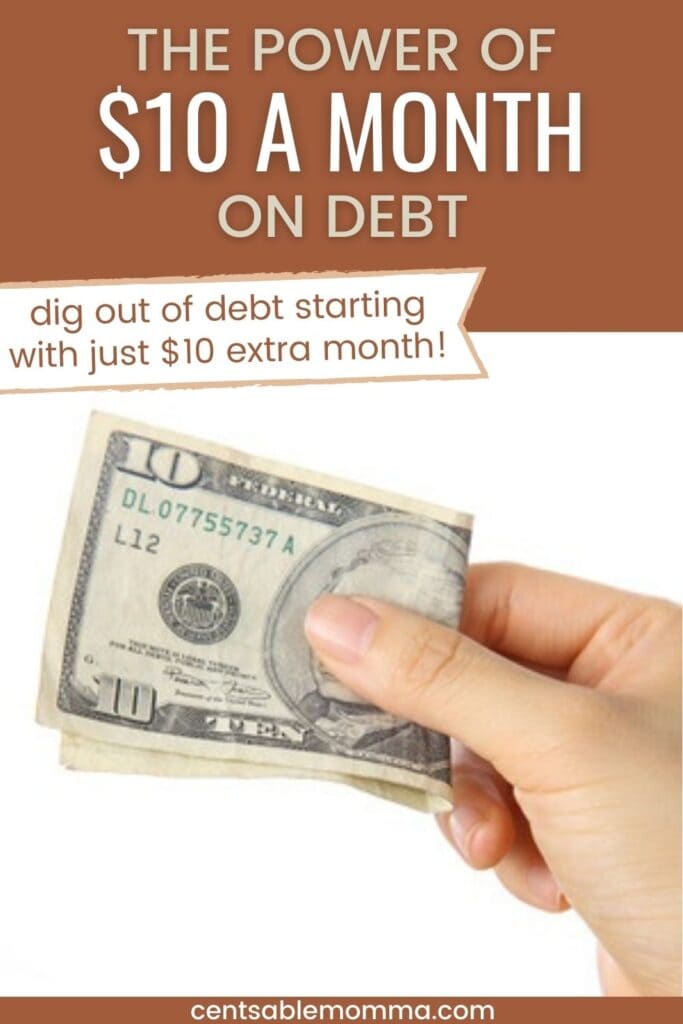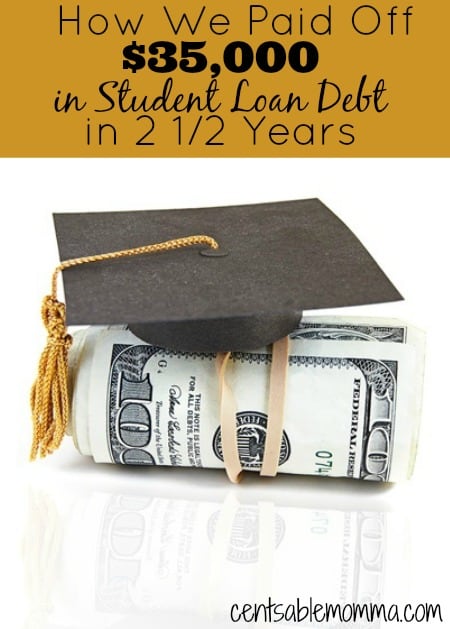
Perhaps you'd love to make a change and start working your way from under credit card debt, student loan debt, your auto loan, or your mortgage, but you're living paycheck to paycheck and just don't see where that extra money is going to come from to pay everything off.
You may feel overwhelmed and feel like it's just easier to continue living how you're living rather than make any change since it's not likely to make a difference.
But that's not true!
Starting with anything is better than not starting at all! Can you come up with just $10 extra a month to pay towards debt? If you can, add it to your debt repayment. It's small, but it can make a difference over the long run.
If you pay just an extra $10 per month on a $150,000 mortgage with a 4% interest rate, you can save $3,243 over the course of your 30 year mortgage and shave 9 months off your mortgage. Plus, if you pay PMI on the mortgage, you'll likely be able to cancel it earlier than scheduled.
If you're paying off credit card debt with a much higher interest rate, it can have an even larger impact on your savings. Remember, every dollar you pay off is interest you don't have to pay over the long term!
You can use this mortgage calculator and auto loan calculator to see how extra payments will affect your own loans.
The Power of Seeing the Balance Decrease
Once, you make that small change and start paying the extra $10 a month towards debt repayment, you're likely to discover that you like seeing the balance on your debt decreasing just a bit faster than normal, and you might be willing to make a few life changes to save some extra money so you can pay just a little more each month.
When we were paying off my student loans, I loved to see the balance dropping, and I was super motivated to find even more money that I could pay each month to get it paid off even faster. It turned into a game with me.
Do Extra Payments Automatically Go to Principal?
It depends on the loan. When we had an auto loan, extra payments just prepaid interest and advanced the payment due date rather than automatically going towards the principal. You don't want that to happen!
Call your lender and find out how extra payments are applied to the loan. If they don't automatically go towards the principal (the amount left on the loan), then find out what you need to do to pay down principal with extra payments.
In the case of our auto loan, we had to send extra principal payments to a separate address rather than just pay extra on the payment.
How about you? Do you feel like paying an extra $10 is not even worth it? If you've started paying extra on your loan, has it motivated you to find even more you can send in?
Additional Related Posts You Might Like:
How We Paid off $35,000 in Student Loan DebtHow to Stay Motivated to Pay Off Debt
7 Tricks to Pay Off Your Mortgage Early























Erin says
Definitely worth it! All those small amounts really add up!
Kristin says
Yes! I love making an extra $65/month toward my auto loan! Watching the debt disappear is sooooo gratifying. And seeing that a payment isn't due until a couple of months in advance is a nice safety net, too!
Lauren says
My husband and I have been paying an extra $6 on one of my student loans. It happened on accident when I round up when we were guessing what our budget might look like. We ended up paying the extra $6 and saw how much money we saved on the back end. It was amazing how much interest we saved! We ended up continuing to pay the extra $6 on that and added $10 onto another student loan. It is completely worth it. I would encourage you all to look at how much you save at the end of each payment. It really helps keep you motivated. I know some people who keep a change jar in their house. Once it gets full they roll the coins and use that money to pay off debt. It is amazing how much loose change adds up.
Jan B says
To Kristen,
I certainly wouldn't want to impose on your thought process as someone who "knows better" but may I just point out something here unoffensively?
One may not know that when one puts an extra $65 on a car loan and then seeing that one doesn't have a payment due for a couple of months, is not progressing toward paying off the loan quicker or cheaper even. The way to pay off an auto loan sooner and pay a bit less interest in the future over the life of the loan, is to pay extra toward the principal. I would google "auto loan principal" to see the definition of such because I may not communicate its meaning in the most understandable way here.
Yes, one does have a bit of $ ("safety net" or also known as emergency savings fund) in between 2 month's of payments, but it may be that there is another acceptable alternative to paying the loan off faster and having the emergency fund build over time AT the same time.
If one has an extra $65 per month, one could pay $15 in addition to the regular car payment toward PRINCIPAL only, to address paying the car down quicker (notice I didn't say quickly, as this is slow and steady not quick and peppy good news).
Then, one could bank the remaining $50 in a hands off savings type of emergency fund.
IMHO, everyone should try to fund an emergency savings of $550 for the unexpected and $50 a month can certainly do that in about a year, or even quicker with a bit more thrown in.
The topic here was paying just $10 more toward debt to watch a balance decrease. Putting $15 toward the principal would definitely fit the pattern of paying off a car loan slowly over time and saving a bit of interest. One can check an amortization schedule to get a more comprehensive display of the numbers and how it can work individually.
Go to bankrate.com for that schedule or just google "auto loan amortization calculator".
Best wishes! 🙂
Ash says
You are correct, when there is principal involved, there are two ways to “get ahead.” Either keep paying forwards on the payments or to reduce the overall principle that the interest is being calculated on- one may call the finance company and have the overage applied to principle. The latter is a common practice and all financial institutions should be readily happy to do that for their customers.
AmberLee Johnson says
At least switch to paying bi-weekly if you can’t afford to increase your payment. So instead of $600/month you would pay $300/bi-weekly. Most lenders will allow bi-weekly on autopay.
This will have the same effect as increasing payment amount.
If you can do both, pay bi-weekly and increase payment amount, the savings will be even greater!